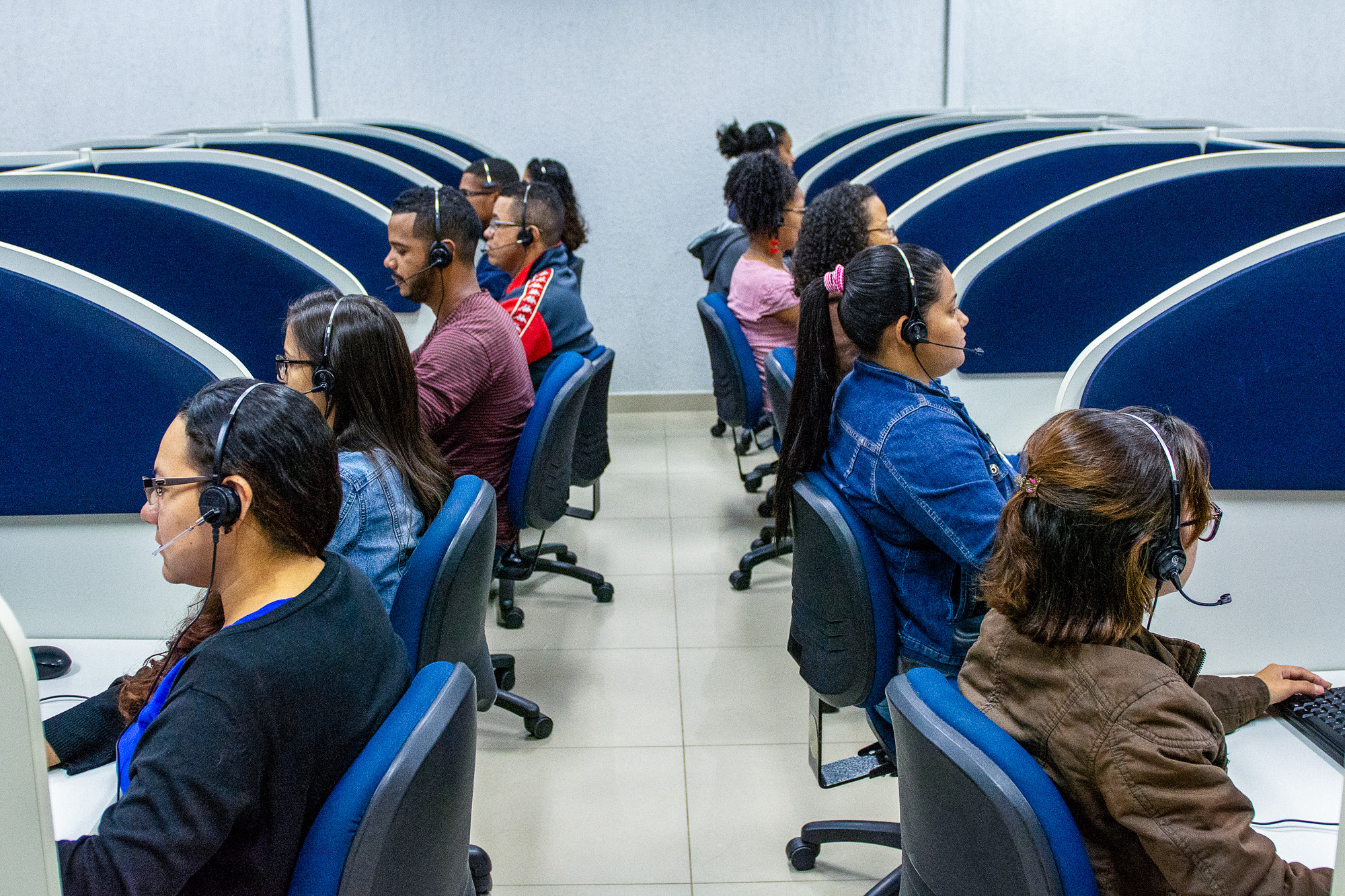
Tunis: Capital of Call Centres
Published on
Translation by:
Faith WilliamsThere are currently almost four hundred call centres in the capital of the North African state, including the HQs of multinational companies and local businesses targeting the European market. Is Tunis becoming an offshore outpost of the cognitive proletariat? Q Code Magazine reports.
Leila is silent for a few seconds, she buys some time before beginning to recite the script she knows off by heart: "I'm Juliette and I'm calling to offer you a box of products from..."
She doesn't have time to finish the sentence before the woman on the other end hangs up. They are divided by the Mediterranean. Leila is Tunisian, with long hair flowing from her head. Her piercing eyes are highlighted by black Kajal. She speaks Arabic, French and English. She has just left the University of Arts, and for a couple of months she has been working in the field of telemarketing for a Swiss cosmetics company.
"Psychologically it's frustrating. I leave with my ears ringing. I began to suffer with insomnia due to the phone being slammed down [so often]." Her voice cracks, perhaps out of anger, perhaps out of ill-concealed resignation. "They pay me 700 Dinars a month, less than 250 Euros."
The El Dorado of Call centres
Numerous marketing multinationals have made their home in the industrial areas of Tunis, like Charghia and Lac. These include the French Teleperformance, the American Concentrix, Nexus Contact Center (which has offices in Tunisia and Romania, but customers in French-speaking countries and Italy), and national companies such as PhoneAct and Tricom.
The city centre, on the other hand, is teeming with smaller, often informal operations housed in the 20th Century Art Nouveau style buildings. Medium-sized companies are also based in the Montplaisir district, where the grey of Fordist towers fades into the sky.
PhoneAct is one of the main communications operators in the Maghreb. It employs six hundred people and boasts companies such as Renault, Samsung and Manpower among its clients.
Like other such companies present in Tunis, it covers a wide range of activities including remote payments, after-sales services via telephone, email and chat, as well as telemarketing and customer satisfaction surveys. We could, perhaps, call this the 'gig economy'. In Tunis, however, this fringe of post-modernity manages to muster together the resigned enthusiasm of the country's young unemployed, who number 36% in total. While the wages offered by multinationals remains low, they are nevertheless competitive: an employee at the registry office, for example, earns 750 Dinars a month.

It seems like every single high school leaver or university graduate has had some kind of work experience in a call centre. Perfect French, or knowledge of other languages - predominantly English and Italian - is enough to find a job easily. Performance anxiety in large open spaces plus limited career opportunities mean that turnover is constant, like in McDonalds.
The websites of the leading groups show how much these companies invest in building a winning brand image.
Teleperformance boasts of career opportunities in a young and dynamic environment, claiming they are "the world leader in multi-channel customer experience."
Present in the country since 2000, the company employs six thousand people in five call centres in Tunis and nearby Sousse. The multinational was awarded 'Best Place to Work in Tunisia' in 2019 and ranked 'Best Employer' for the second year running. It also received the Aon Hewitt Global Best Employers Label in 2018.
"I was only supposed to stay here for three months but now I've been here eighteen"
Yet talking to the employees outside the TP gates, the stories are rather different. "I was only supposed to stay here for three months but now I've been here eighteen." Amine is twenty eight, with tanned skin and a few white hairs that make him look older. "You don't have a career here, you work for 700 Dinars a month because you don't have a choice."
Amine works part-time for 28 hours a week, specifically four days for seven hours straight. He is a technical advisor for SFR, the third largest telephone operator on the French market, which, like others, has decided to outsource after-sales services.
He responds to those who want to terminate a contract, reactivate a router remotely, or simply complain about the connection. The pressure is constant: "Sometimes I feel my brain go haywire and I stop responding. I sit staring at the screen for a few minutes, then I carry on." He wears the TP logo round his neck, in a shimmering fuchsia just like the logo.
"I would have liked to do something else with my life"
While we're talking, a man in his seventies with a limp walks over. Amine hands him a Dinar and the old man thanks him, looking up to heaven, Hamdoullah: "Thank God!"
"But in Tunis" – continues Amine – "we young people remain 'nickel', as bright as stainless steel." Now his eyes are shining, and a jaunty and slightly childish look emerges under his thick lashes.
"Maybe someone will tell you otherwise, that TP pays more than average and offers a long term career. But, I, you see, wanted to do something else with my life. I'm a sound engineer, but its hard to even find a stage here. So at weekends, I'm a DJ" – he repeats, while he opens his shoulders and looks up – "TP, inshallah it will just be a temporary passage."
A debt-ridden country
HP, the well-known computer brand, has chosen to set up a communications branch in Tunisia rather than rely on outsourcing. The national headquarters, in a huge glass and steel building in the industrial area of El Ghazela, is tasked with marketing and after-sales.
Employees offer technical assistance in English, Italian and French. If you can't connect your printer in Milan, and you decide to ask for help over the phone, chances are they'll get back to you from here. A similar choice was also made by Lycamobile, who manage "customer relations" for the Italian and Spanish markets from Tunis.
"We should ask ourselves where Tunisia fits into the international division of labour"
According to the economist, Abdeljelil Bedoui, President of the Tunisian Forum for Economic and Social Rights, the gap between the dynamics of production and those in the labour market has widened, so that in spite of an ever-increasing number of graduates, jobs created remain precarious and low-skilled.
"We should opt for an alternative model, overcoming the 93 law on investments, which establishes the neutrality of the state and the abandonment of sector policies."
It is difficult to say why Tunisia has become the 'country of call centres', but the indifference of the state with respect to types of investment, and the fact it is caught between the grip of a high unemployment rate and high foreign debt, has undoubtedly contributed.
"We should ask ourselves where Tunisia fits into the international division of labour," continues Bedoui. "If it only attracts multinationals for the low cost of the workforce, among other things which are not justified by a difference in productivity compared to European countries."
"In call centres," he continues, "the technical know-how is low, so the capital invested can be amortised in a short time. This accentuates competition between countries and the precariousness of workers, since it is easy to close one office and reopen elsewhere."
To attract foreign investment in the jungle of global competition, the Tunisian state exempts companies from taxation for ten years. Such reliefs, in a heavily indebted country, speak of the hunger for work.
Among other things, stability doesn't seem to exist here. Since 14 January, the ten-year anniversary of the revolution that overthrew the Ben Ali regime in 2011, the capital has been the scene of violent protests. These have erupted in the popular neighbourhoods of the city centre and in the huge suburb of Ettadhamem – ('solidarity' in Arabic) which resembles Scampia (a suburb north of Naples) due to its dormitory buildings, unemployment and petty crime.
In a globalised world that exploits the potential of specific territories, the mini job, such as those offered in both the call centres of Tunis and the Western 'gig economy' act as a buffer against growing malaise. Yet they are only able to give temporary respite to many young people who see their own desires to make-it suffocated.
This article is published as part of an editorial partnership with QCodeMag. The article, re-edited by Cafébabel editorial staff, was originally edited by Angelica Erta and published on QCodeMag here on 8April 2021.

Translated from Tunisi capitale dei call center



